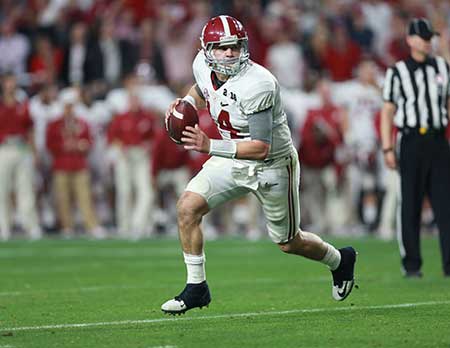Auld Lang Syne of Progress as Buyers Praise College Football New Year’s Shift

The smarter way to stay on top of broadcasting and cable industry. Sign up below
You are now subscribed
Your newsletter sign-up was successful
Sports media buyers are praising College Football Playoff officials for the recent decision moving several of the future semifinal national championship games away from weekday New Year’s Eve dates when viewer levels are much lower.
That decision came seven months after the combined viewership of the two New Year’s Eve games played last Dec. 31 declined 40% from the previous season’s semifinals, which were played on New Year’s Day. One consequence of that dramatic drop was that ESPN had to negotiate some $20 million in makegoods.
“We are all happy to see the CFP make the changes,” says Adam Schwartz, director of national broadcast, sports media, a Horizon Media, which does ad buying for Orange Bowl name sponsor Capital One, among other clients. “The CFP officials worked collectively with ESPN and advertisers to come up with a solution that made everyone happy.”
Related: Disney Buys One-Third of BAMTech for $1 Billion
Kevin Collins, senior VP of sports investment at Magna Global, described the decision as a “step in the right direction,” although he added that televising the two semifinal games on New Year’s Day every year would be the ideal alternative.”
Under the original schedule, which was set through 2025, the semifinals would have aired on weekday New Year’s Eves in 2018, 2019, 2024 and 2025. Those dates were moved to the late-December Saturdays before the respective New Year’s Eves.
While it all seems to be sweetness and light now between the CFP executives and advertisers, it wasn’t that way immediately following this past season’s semifinals. Even amid skepticism heading into the semifinals, CFP executive director Bill Hancock responded to publicly expressed angst by advertisers and media agencies by declaring, “It’s a done deal. We’re not going to change.” Hancock insisted that televising the games on New Year’s Eve would “change the culture of New Year’s Eve in the country.”
The smarter way to stay on top of broadcasting and cable industry. Sign up below
Related: Disney Q3 Profit and Revenue Rise on Box Office Breakout
Since then, however, ESPN put together homes using television (HUT) data for New Year’s Eve, which historically showed low levels of viewership throughout the day getting lower as the day went into night. ESPN was pressured by advertisers who had done their own viewership data studies.
Hancock and the CFP committee eventually relented. Under the new schedule, the semifinals will remain on one weekday New Year’s Eve, on Friday, Dec. 31, 2021. This season’s semifinals will be played on Dec. 31 but it is a Saturday.
“I’m glad the CFP decided to consider chasing the audience rather than being stubborn and trying to change tradition,” Schwartz says. “From both an advertiser and agency perspective, this change is a good thing.”
Related: Study—eSports' Growth Is Slowing
Schwartz acknowledges that ultimately the advertiser clients are protected by ratings guarantees and get makegoods, but he says most advertisers today buy into big games to be in those live telecasts, not to receive commercial time in other events at later dates.
Schwartz said his own agency studied the New Year’s Eve HUT levels and “found viewership drops off the cliff at a certain point every year.”
A substantial promotional campaign by ESPN and ABC to try to push audience to the semifinal games wasn’t enough to motivate viewers to tune in.
Related: Snapchat, NFL Expand Content Deal
While Collins would like to see the semifinals televised on New Year’s Day every season, particularly since the semifinals two years ago on New Year’s Day set college football viewership records, it can’t happen.
That’s because the Rose Bowl is held every year on New Year’s Day and since it is part of the CFP, and the semifinals are rotated, the semis can only air on New Year’s Day during the Rose Bowl’s turn in the rotation. That happens every third year.
While Collins is happy the CFP moved the semifinals away from weekday New Year’s Eves, he says Saturday New Year’s Eves might not be that much better.
Related: Univision, L.A. Rams Strike Preseason Partnership
“HUT levels on Saturday nights are low and on New Year’s Eve Saturday would probably be lower, but better than weekday New Year’s Eves,” he says.
Collins also believes that the semifinal matchups need to be taken into consideration. Strong matchups with marquee name players and an anticipated close game would most likely draw more viewers, even on New Year’s Eve.
Commenting on the CFP decision, Hancock says, “These adjustments will allow more people to experience the games they enjoy so much.” And that’s a good thing for advertisers.
